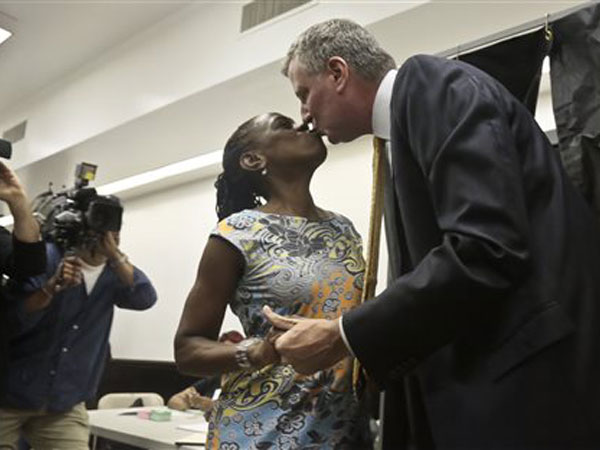
In this Sept. 10, 2013 file photo, mayoral candidate Bill de Blasio, right, kisses his wife Chirlane McCray after casting his primary vote at the Park Slope Public Library in Brooklyn borough of New York. In July 2013, a Gallup poll found that 87 percent of Americans approved of interracial marriage _ the highest rate ever _ compared with 4 percent in 1958. In 2010, more than 15 percent of all new marriages were interracial, according to the Pew Research Center. AP
Another milestone is passing in America’s racial journey: The next mayor of New York City is a white man with a black wife.
Even in a nation with a biracial president, where interracial marriage is more accepted than ever, Bill de Blasio’s marriage to Chirlane McCray is remarkable: He is apparently the first white politician in U.S. history elected to a major office with a black spouse by his side.
De Blasio is preparing to take office on Jan. 1, with McCray playing a major role in his administration.
“It reflects the American values of embracing different races, ethnicities, religions. I think it’s just a great symbol,” said William Cohen, the former U.S. Secretary of Defense, who is married to a black woman.
Cohen was already a senator when he started dating Janet Langhart, a black television journalist. He proposed several times, but she feared that her race would hurt his political future. They married in 1996, a few weeks after Cohen announced he would not seek a fourth term.
“There has been that fear (of interracial marriage) on the part of politicians. I didn’t have it,” Cohen said.
There have been black men in politics who have been married to white women, such as Supreme Court Justice Clarence Thomas. And high-profile women such as South Carolina Gov. Nikki Haley, whose parents are from India, are married to white men.
Yet unions of white men and black women have retained a forbidden aura, Cohen said.
The taboo is declining, polls show.
In July, a Gallup poll found that 87 percent of Americans approved of interracial marriage — the highest rate ever — compared with 4 percent in 1958. In 2010, more than 15 percent of all new marriages were interracial, according to the Pew Research Center.
Yet statistics also indicate why de Blasio and McCray are such a rarity. The Gallup poll showed that white men are the least likely to marry outside of their race.
More than 97 percent of white men are married to white women, while 82 percent of black men, 65 percent of Hispanics and 48 percent of Asians marry within their own group. The figures are based on 2005 census data analyzed by Michael Rosenfeld, a Stanford University sociologist who studies interracial marriage.
Much has been made of the difficulties black women have in selecting husbands from a pool of eligible black men shrunk by unemployment and incarceration. Among black women age 35 and over, more than 25 percent have never been married, compared with about 7 percent of white women, census figures show.
“We’re seeing black women loved in a way we have not seen before,” said Aja Monet, a poet and New Yorker.
She sees this trend in real life and fiction, from McCray to first lady Michelle Obama to the Olivia Pope character in “Scandal,” the hit TV show about a powerful black political operative in a relationship with a white president.
As de Blasio and McCray celebrated on election night with their two children, Tiya Miles saw them on television and stopped in her tracks. “I was very moved,” she said.
Miles, a black University of Michigan professor, recently wrote a column about being stung by the sight of so many successful black men choosing white wives. It feels like “a personal rejection of the group in which I am a part, of African American women as a whole, who have always been devalued in this society,” Miles wrote.
So for her, de Blasio and McCray’s victory feels like confirmation — especially since McCray does not resemble the type of black woman that mainstream America usually deems beautiful, like Halle Berry or Beyonce.
“A woman who has darker skin and natural hair, and a white man,” Miles said. “To see a black woman who is in a long-term relationship with children and her partner, who does not fit that stiff, narrow, idealized image of what a black woman should look like, I think is powerful.”
De Blasio was elected in New York, perhaps the most diverse city in America. But he is connecting with people across the country, especially the children of interracial marriages.
“It’s just the resonance of it. How much it means for families to see a family like them in a visible place,” said Ken Tanabe, a New Yorker with a Japanese father and Belgian mother. He is the founder of the Loving Day organization — www.lovingday.org — which organizes annual events celebrating the 1967 Supreme Court decision that struck down laws against interracial marriage.
Said Cohen, the former defense secretary: “It says a lot about this country. Where we’ve come from, how far.”